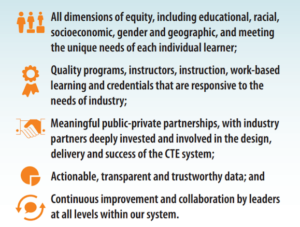Every year, more than 5.5 million secondary learners take advantage of Early Postsecondary Opportunities (EPSOs), including dual and concurrent enrollment and exam-based courses, like International Baccalaureate (IB) and Advanced Placement (AP). EPSOs aim to provide high school learners with an intentionally designed authentic postsecondary experience leading to officially articulated and transferable college credit toward a recognized postsecondary degree or credential. Career Technical Education (CTE) courses make up approximately one-third of all EPSO enrollments and are a critical component of a high-quality CTE program of study, bridging secondary and postsecondary learning.
Advance CTE’s vision, Without Limits: A Shared Vision for the Future of Career Technical Education, calls on states to ensure that each learner’s skills are counted, valued and portable. At the state level, systems are needed to translate competencies and credentials into portable credit and to ensure that all learners have the opportunity to participate in high-quality and equitable EPSO programs. To this end, Advance CTE, in partnership with the College in High School Alliance, surveyed State CTE Directors to better understand state policies that support EPSOs in CTE. The survey revealed key findings, which subsequently led to recommendations for steps to better advance and support CTE EPSOs, ensuring equity and access to EPSOs for all CTE learners. To read more about the results of the survey and our resulting findings and recommendations, or to learn more about the following actions, read the executive summary and associated full report, The State of CTE: Early Postsecondary Opportunities.
To better ensure equitable access for all learners, particularly in CTE EPSO programs, states can take the following actions:
1.Identify and highlight equity goals in statewide EPSO programs and target specific learner populations for recruitment. States with statewide EPSO programs, particularly those with targeted equity goals, have been able to reduce equity gaps by adjusting funding and tuition models, standardizing entrance requirements, providing statewide navigational supports and centralizing articulation agreements. A critical review of state-level data, including conducting opportunity gap analyses, can allow states to target historically marginalized populations for participation while simultaneously ensuring that these learners have access to high-quality EPSOs. Utah has a long-standing statewide concurrent enrollment program that focuses on continuous improvement, particularly for learners of low income, who attend postsecondary institutions at more than twice the rate of learners of low income who do not participate in the program.
2.Increase publicly available and actionable information for learners and their families. Access to high-quality EPSOs for every learner is just one part of equity; equally important is ensuring that every learner is successful by increasing transparency around opportunities and outcomes in EPSOs, including providing state-level outcome data, navigation assistance and career advising throughout the EPSO experience. Increasing communication with parents and learners about available EPSOs, their requirements and available supports will help first-generation learners and under-served groups not familiar with the postsecondary process access these programs and know how the associated credit transfers. States like Indiana, Maryland, and Kentucky all have public dashboards that share both enrollment and outcome data, disaggregated by learner population and program type. Other states, like Massachusetts, aggregate their EPSO programs through an online catalog, with filters for subpopulations, to demonstrate the range of opportunities available statewide.
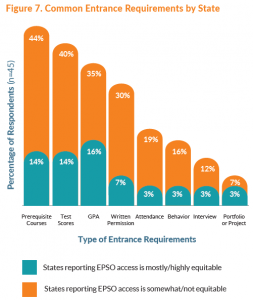 3.Identify and remove barriers to access, including restrictive costs or entrance requirements, and target specific learner populations for recruitment. Data demonstrates significantly higher gains for learners of color in dual enrollment programs compared to their peers not enrolled in EPSO opportunities. While states noted that scholarship and tuition supports reduce barriers to entry, burdensome entrance requirements and a lack of information about EPSOs limit a learner’s ability to participate. For example, Tennessee’s statewide EPSO program offers grants that allow learners to take up to 10 dual enrollment courses for free. As states look to increase postsecondary attainment goals, they can leverage enrollment and outcome data to identify opportunity gaps and examine root causes, such as restrictive admissions requirements that may affect learners disproportionately.
3.Identify and remove barriers to access, including restrictive costs or entrance requirements, and target specific learner populations for recruitment. Data demonstrates significantly higher gains for learners of color in dual enrollment programs compared to their peers not enrolled in EPSO opportunities. While states noted that scholarship and tuition supports reduce barriers to entry, burdensome entrance requirements and a lack of information about EPSOs limit a learner’s ability to participate. For example, Tennessee’s statewide EPSO program offers grants that allow learners to take up to 10 dual enrollment courses for free. As states look to increase postsecondary attainment goals, they can leverage enrollment and outcome data to identify opportunity gaps and examine root causes, such as restrictive admissions requirements that may affect learners disproportionately.
4.Increase supports for learners enrolled in EPSOs to ensure completion. While capacity challenges do exist, research indicates the value of early warning systems, counseling programs, and financial supports that remove or overcome barriers to completion. Statewide incentives can encourage districts to expand these types of systems that allow secondary learners to be successful in EPSOs. Alaska’s Acceleration Academy helps high school learners complete math or science courses over the summer to prepare them for participation in the Alaska Native Science and Engineering Program, an EPSO partnership with the University of Alaska-Anchorage.
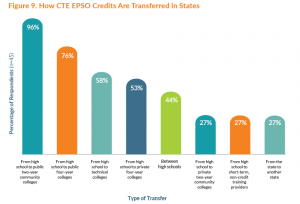 5.Expand statewide and inter-state articulation agreements to account for all types of CTE EPSOs. Statewide agreements can help guarantee recognition of CTE EPSO credit and facilitate automatic transfer between a secondary institution and a corresponding postsecondary institution of the learner’s choice. Ensuring that the transfer of credit is as frictionless as possible is vital to supporting learners as they transition into postsecondary education and continue in a degree program. As states work to ensure that each learner’s EPSO experiences consistently are counted toward articulated credit, they should also ensure that this credit contributes to core credits in a CTE program of study and not just elective credit. States can develop additional guidelines and legislation that ensures the connection between an EPSO and a program of study. Ohio has Career-Technical Assurance Guides (CTAGs) that provide automatically articulated and transferable credit upon completion of CTE coursework.
5.Expand statewide and inter-state articulation agreements to account for all types of CTE EPSOs. Statewide agreements can help guarantee recognition of CTE EPSO credit and facilitate automatic transfer between a secondary institution and a corresponding postsecondary institution of the learner’s choice. Ensuring that the transfer of credit is as frictionless as possible is vital to supporting learners as they transition into postsecondary education and continue in a degree program. As states work to ensure that each learner’s EPSO experiences consistently are counted toward articulated credit, they should also ensure that this credit contributes to core credits in a CTE program of study and not just elective credit. States can develop additional guidelines and legislation that ensures the connection between an EPSO and a program of study. Ohio has Career-Technical Assurance Guides (CTAGs) that provide automatically articulated and transferable credit upon completion of CTE coursework.
Visit Advance CTE’s Learning that Works Resource Center for additional resource related to specific EPSOs and equity and access supports.
Dan Hinderliter, Senior Policy Associate


 “Go forth without limits!” was an apt parting chat message as over 70 state Career Technical Education (CTE) leaders from across 16 states convened virtually last month to launch the community of practice for
“Go forth without limits!” was an apt parting chat message as over 70 state Career Technical Education (CTE) leaders from across 16 states convened virtually last month to launch the community of practice for 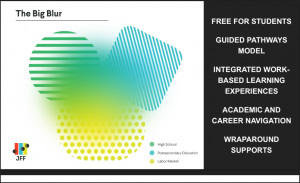 Vargas challenged attendees to dream big and be the new models for scalable solutions by being a “network facilitator,” by combining career pathway expansion with intentional investments in collaboration and sustained partnershi
Vargas challenged attendees to dream big and be the new models for scalable solutions by being a “network facilitator,” by combining career pathway expansion with intentional investments in collaboration and sustained partnershi Advance CTE and ACTE Host Congressional CTE Month Briefing
Advance CTE and ACTE Host Congressional CTE Month Briefing 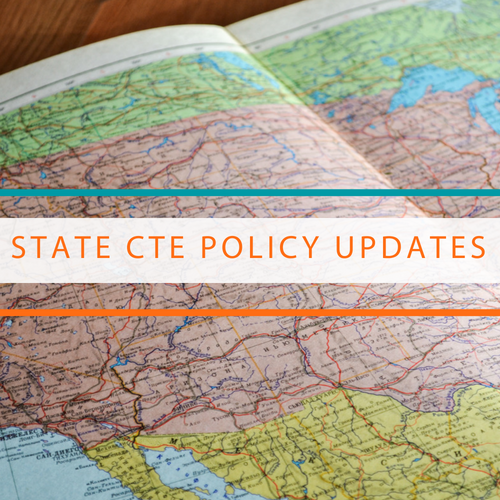 State education agencies, legislators and educators faced significant challenges from
State education agencies, legislators and educators faced significant challenges from 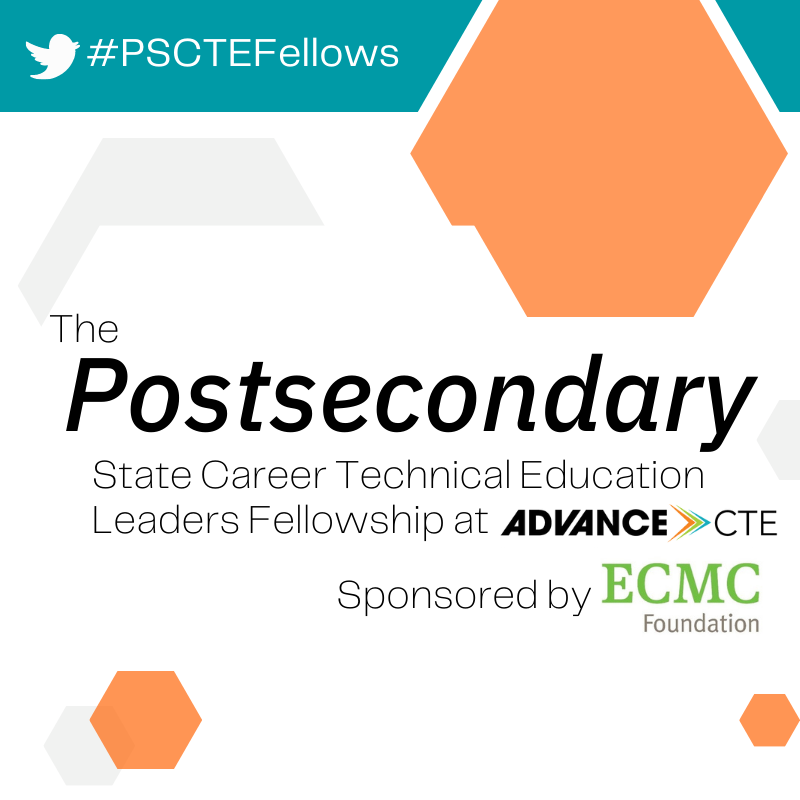 Last week, Advance CTE and ECMC Foundation announced the 15 Fellows joining the inaugural cohort of
Last week, Advance CTE and ECMC Foundation announced the 15 Fellows joining the inaugural cohort of  Advance CTE welcomes Dr. Kevin R. Johnson Sr. as a Senior Advisor for Equity. Dr. Johnson oversees and manages major organization-wide, highly visible initiatives that support, promote and increase equitable access to and success in high-quality Career Technical Education (CTE), including overseeing Advance CTE’s external equity strategy. Two of the first and major priorities in this role for Dr. Johnson will be leading and managing the inaugural cohort of Fellows for the
Advance CTE welcomes Dr. Kevin R. Johnson Sr. as a Senior Advisor for Equity. Dr. Johnson oversees and manages major organization-wide, highly visible initiatives that support, promote and increase equitable access to and success in high-quality Career Technical Education (CTE), including overseeing Advance CTE’s external equity strategy. Two of the first and major priorities in this role for Dr. Johnson will be leading and managing the inaugural cohort of Fellows for the 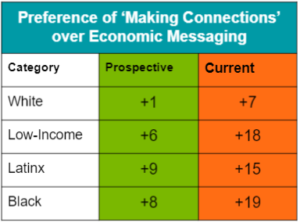 These findings have important implications for how CTE can close equity gaps, as well as what aspects of CTE should be elevated when conducting outreach to historically marginalized populations. Communications should be specific about the equitable opportunities provided through CTE to prepare for and jumpstart postsecondary education, as well as to gain visibility and networks through connections and hands-on experiences with like-minded educators, peers and employers .
These findings have important implications for how CTE can close equity gaps, as well as what aspects of CTE should be elevated when conducting outreach to historically marginalized populations. Communications should be specific about the equitable opportunities provided through CTE to prepare for and jumpstart postsecondary education, as well as to gain visibility and networks through connections and hands-on experiences with like-minded educators, peers and employers . 